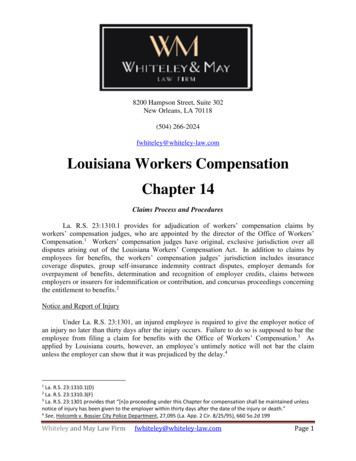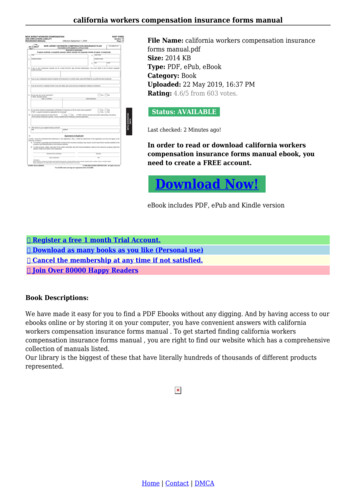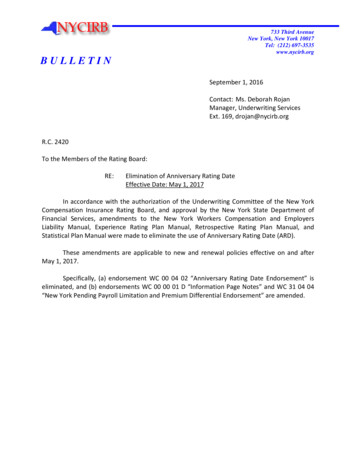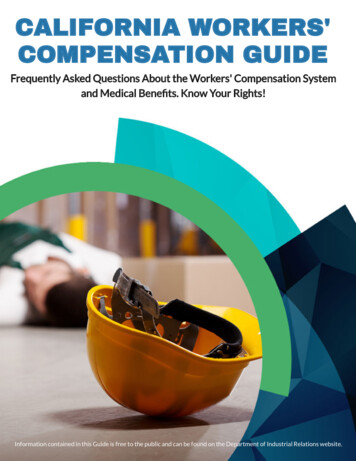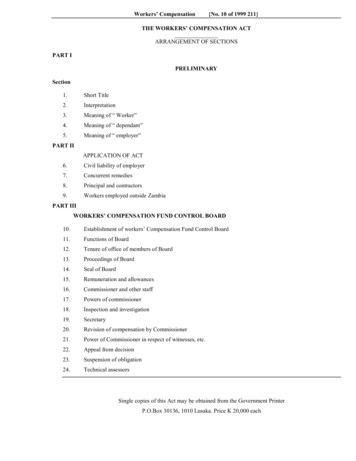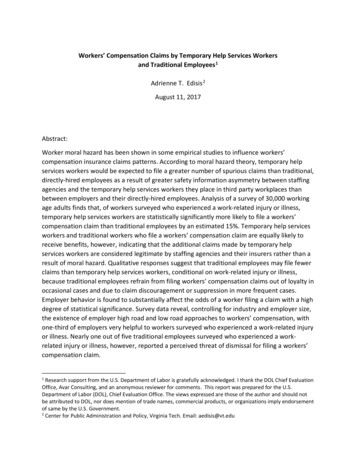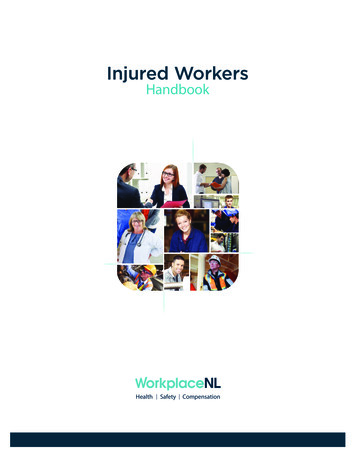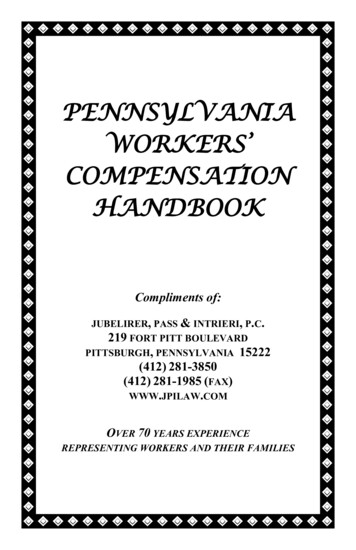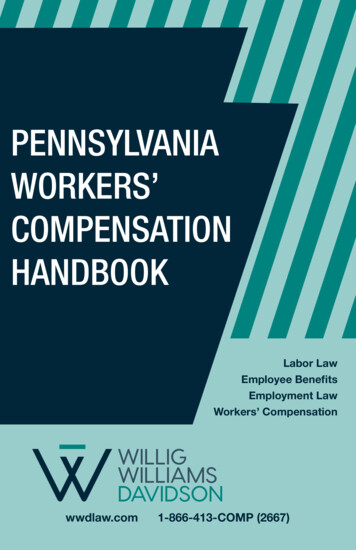
Transcription
SATIONCOMPENSATIONHANDBOOKHANDBOOKLabor LawEmployee BenefitsEmployment LawWorkers’ Compensationwwdlaw.com1-866-413-COMP (2667)
TABLE OF CONTENTSAbout Willig, Williams & Davidson. 4Section 1: Understanding workers’ compensation. 6Section 2: What you should do if you have been injured at work. 8Section 3: Understanding your employer’s responsibilities.14Section 4: S eeking medical treatment for work related injuries andpayment of medical bills.16Section 5: U tilization review requests, medical exams, medical reportsand changes in medical status.20Section 6: What to do when your claim is accepted, denied or terminated.24Section 7: Wage loss and specific injury benefits.32Section 8: Other benefits.38Section 9: Suing for negligence and recovering penalties for delays.42Pennsylvania Workers’ Compensation Work Injury Checklistand Notebook.44Pennsylvania Workers’ Compensation Handbook 3
ABOUT WILLIG, WILLIAMS & DAVIDSONNo one plans on a work-related injury. Most workers never give workers’compensation a thought until after they have been hurt or become sick.Then, on top of dealing with their injury and medical treatment, they areforced into a complicated legal system without the proper tools to guidethem through.PentionciaWillig, Williams & Davidson is committed to helpingania Bar Assylvonsworkers navigate the system, so they can focuson one thing – getting well. Our team of certifiedworkers’ compensation attorneys use their skillsto assist sick and injured workers through the legalrkti oers’ Co m pensasystem, so the workers can maintain their dignityand get the treatment and benefits they deserve.Our attorneys provide advice, counseling and legal representation tosick and injured workers, to make sure that they receive 100 percent ofthe benefits required by law. And our work injury lawyers who practice inthis area, limit their representation to the protection of injured workers.WonCERTIFIEDOur workers’ compensation attorneys utilize the firm’s wide-rangingunion-side practice to help further the cause of providing safe workingconditions and fair benefits for injured workers. Unlike some other firms,our attorneys are uniquely suited to understand the complex interplaybetween workers’ compensation law and other employment rights, suchas union benefits, the Family and Medical Leave Act (FMLA), Act 534,and the Heart & Lung Act. Our attorneys use that knowledge to lookbeyond the workers’ compensation law and make sure that our clients’rights are fully protected.Our attorneys also work closely with union clients to identify injurytrends and eliminate unsafe practices and conditions at work beforeworkers get hurt. We push the limits of the workers’ compensation lawto force employers to stop illegal practices like refusing to pay loss ofovertime to injured workers or illegally reducing benefits for injured retirees.Our attorneys use their expertise and broad client base to leverage thebest possible results for our clients, based on our firm belief that sickand injured workers deserve the best possible legal representation.Willig, Williams & Davidson1-866-413-COMP (2667)
ABOUT THE PENNSYLVANIAWORKERS’ S’ORKERS’WCOMPENSATIONENOSAK TIONCHOANMDPBOHANDBOOKwwdlaw.comLabor LawefitsEmployee BenEmployment LawpensationWorkers’ ComP (2667)1-866-413-COMThis handbook has been prepared byWillig, Williams & Davidson to provideassistance to individuals who may beentitled to benefits under thePennsylvania Workers’ CompensationAct. It is not intended as a substitute forlegal counsel, nor is it designed to answerall questions which might arise.This handbook has been set up in a“question and answer” format to explainbasic principles in easy to understandlanguage.Where to Go for More InformationIf you have questions and would like todiscuss a work injury or workers’compensation claim with us, please feelfree to call Willig, Williams & Davidsonand our work injury lawyers at1-866-413-COMP (2667) or 1-215-656-3600.Pennsylvania Workers’ Compensation Handbook 5
Section 1: Understanding workers’ compensationWhat is workers’ compensation?The Pennsylvania Workers’ Compensation Act provides wage lossand medical benefits to compensate employees suffering from workrelated injuries or diseases. The Act also provides for death benefits tothe dependents of workers who die as a result of a work-related injury ordisease. Workers’ compensation benefits generally are paid by privateinsurance companies which have insurance policies with your employer.While the Bureau of Workers’ Compensation administers the system, itdoes not make the initial determination as to whether you are entitledto receive workers’ compensation benefits. If you disagree with theinsurance company’s determination, you may file a petition to havea workers’ compensation judge decide your case.What is a compensable workers’ compensation injury in PA?Under Pennsylvania law, the following conditions are consideredcompensable injuries under workers’ compensation:1. Specific incidents that cause an injury.2. Repetitive activity resulting in an injury. This includes conditions likecarpal tunnel syndrome caused by repetitive movement.3. A pre-existing condition that has been aggravated by work activities.This includes conditions like arthritis, heart disease. The pre-existingcondition does not have to be work-related for the aggravation to becovered under workers’ compensation.What diseases are covered by the Pennsylvania Workers’Compensation Act?The Act provides a list of specific diseases which are recognized asoccupational diseases. These include (but are not limited to):tuberculosis and hepatitis for nurses, blood processors, and relatedprofessions which involve exposure to these diseases; diseases of theheart and lungs for firemen who have four or more years of service;pneumoconiosis and silicosis for any occupation that involves directcontact with or exposure to coal dust; specific types of chemicalpoisoning (such as lead, mercury, phosphorus and arsenic) foroccupations involving direct contact or exposure to these chemicals,or to their preparations or compounds.Willig, Williams & Davidson1-866-413-COMP (2667)
Section 1The Act provides for compensation for other occupational diseases notspecifically recognized, as long as three criteria are met:a. the employee is exposed to the disease by reason of employment;b. the disease is causally related to the employee’s main industry oroccupation; andc. t he occurrence of the disease is substantially greater in the industry oroccupation than it is in the general population.Even if you suffer from a disease which is neither specifically recognizednor meets the criteria listed above, you may be entitled to workers’compensation benefits.If you develop the disease as a result of an exposure which occurs atwork, workers’ compensation benefits are the same as those paid forinjuries. Pre-existing occupational diseases aggravated by employmentare treated in the same manner as injuries. The criteria listed in theprevious paragraph do not have to be satisfied for this type of claimto be compensable.Firefighters, police officers and certain public safety employees may beable to claim benefits for specifically listed diseases/illnesses related totheir employment.Must the injury occur on the employer’s premises to becompensable under PA law?An injury does not need to occur on the employer’s premises to becompensable under the Act. As long as your injury occurred while youwere in the course and scope of employment, the injury is compensable.For example, if you are injured in an automobile accident while runningan errand for your employer, the injury is normally compensable. On theother hand, injuries that occur while you are on your way to or fromwork are not compensable. If you are injured on your employer’spremises on your way in or out of work, your injury may becompensable. In addition, commuting may be covered if you area traveling employee.Pennsylvania Workers’ Compensation Handbook 7
Section 2: What you should do if you have been injuredat workWhat should I do if I suffer a work injury?When you suffer an injury as a result of an accident or repetitive injury,you should give notice to your supervisor or any other person designatedby your employer immediately. You should report the injury even if youdo not anticipate missing time from work. Notice can be given eitherverbally or in writing. If required, complete an incident report. If yourequire medical treatment, you should request the list of designatedhealth care providers approved to treat work injuries. You are requiredto treat with these physicians for 90 days after the date of your first visitto the doctor. If your employer does not have a list of approved doctors,seek medical treatment from any physician. Be sure to inform yourphysician that your injury is work related.Within 21 days of your injury, your employer or its insurance companymust notify you whether they agree that you sustained a work injury. Thecompany is required to issue a form entitled Notice of CompensationPayable, which agrees that you have a work-related injury, or a Noticeof Compensation Denial, which denies that you have a work injury. Ifyour claim is accepted, review the Notice of Compensation Payable todetermine whether your injury is described accurately and whether yourwages are accurate. If your claim is denied, seek medical care with yourown physician and obtain legal advice.What is a Notice of Compensation Payable?A Notice of Compensation Payable is a legal document issued by theworkers’ compensation insurance company or employer. If you miss timefrom work, the Act requires that the insurance company or employerdecide whether they are agreeing to cover an injury under the law within21 days of the date of disability. The Notice of Compensation Payable islegal confirmation that an injury has been accepted under the law. TheNotice contains important information about both the wage loss andmedical benefits to be paid. Specifically, the Notice of CompensationPayable will state the amount of the injured worker’s average weeklywage, upon which the wage loss benefit is calculated. In addition, theamount of wage loss benefits is listed, along with the start date of thebenefit. The Notice will list the legal description of the work injury.Willig, Williams & Davidson1-866-413-COMP (2667)
How should a work-related injury or disease be reported forpurposes of workers’ compensation?It is your responsibility to report an injury or disease to your employer assoon as possible. The report should include an explanation of the time,place and type of injury. The notice must contain an explanation as tohow the injury occurred and how it was work-related. Although verbalnotice is legally sufficient, it is best if the notice is in writing. You shouldretain a photocopy of the notice. You should give as much informationas possible to your employer regarding the circumstances surroundingthe injury. The report may be given to the employer by you or bysomeone acting on your behalf.There are two time limits which are strictly enforced:1. N otice given more than 120 days from the date of injury will likelypreclude workers’ compensation benefits; and2. Y ou must give notice within 21 days from the date of injury inPennsylvania in order to receive workers’ compensation benefitsfrom the first day of injury.If you do not give notice until the 22nd day after the injury occurred, youwill only receive workers’ compensation benefits from that date on. Ifnotice is given within 21 days, however, you will receive benefits fromthe first day of injury.Pennsylvania Workers’ Compensation Handbook 9Section 2It is important to make sure that the description of the injury is correctbecause the insurance company will only be required to pay forreasonable and necessary medical treatment related to that specificwork injury. For example, if the Notice lists a shoulder sprain, theinsurance company may not be required to pay for surgery to repaira rotator cuff tear.
How should an occupational disease be reported?The time period for giving notice of an occupational disease begins torun when you know or should know that your occupational disease isrelated to employment. The important thing to remember is that if youlearn that you have contracted an occupational disease, you shouldprovide immediate notice to your employer, or a previous employer,even if you have not worked for the employer recently. It is sufficientfor someone acting on your behalf, including your doctor, to providesuch notice. The notice must contain a statement that the diseaseis work-related; otherwise, you might be denied workers’compensation benefits.What are considered occupational workplace diseases?Occupational diseases include chronic disease caused by or due toactivities or environmental factors at the work place. There are manydifferent types of occupational diseases. They can include: cardiovascularsystem disease; central nervous system disease; heart and lungdisease; liver disease; musculoskeletal disease; occupational cancerssuch as mesothelioma; psychiatric diseases/mental health disturbance;renal disease; reproductive system disease; and skin disease.These occupational diseases are often caused by exposure to“causation agents,” which can include: asbestos, gas, infectious agents,metals, noise, pesticides, herbicides, rodenticides, fungicides, pressure,radiation, solvents, temperature and vibrations.What should I do if my employer insists that I use my sick timeinstead of workers’ compensation?Because it ordinarily takes several weeks for a worker’s compensationclaim to be processed, there is no reason for you not to use accumulatedsick leave. If you use sick time, make sure that you report that you areusing sick time for a work-related injury. The Workers’ CompensationAct ordinarily does not give insurance companies the right to take acredit for sick pay you receive. If you are a member of a union, checkyour union contract carefully to determine what benefits are available.If your employer forces you to use sick time for a work injury, you areprobably not being covered under PA Workers’ Compensation.Willig, Williams & Davidson1-866-413-COMP (2667)
Once your claim is accepted, you may need to communicate with theadjuster regarding the payment of your wage loss benefits or obtainingmedical treatment. Keep in mind, the adjuster works for the insurancecompany and may not be as responsive to you as you would like. Bepersistent, follow up, and ask for a supervisor if you cannot get aresponse from the assigned adjuster. The adjuster is not required toadvise you of your rights under the law and often providesmisinformation. Being informed about your rights is the bestprotection you have from mistreatment by an adjuster.Should I sign a medical records release for the workers’compensation insurance company?Your employer’s workers’ compensation insurance company is requiredto investigate your claim and determine whether it will be covered underworkers’ compensation. They will want to see what the doctors aresaying about your condition. Signing the release may make it easierfor the company to investigate and approve your claim. The law doesnot require you to sign a medical records release for your claim to becovered under workers’ compensation.How do I know if my workers’ compensations claim has beenaccepted?Your claim has not been legally accepted under the PennsylvaniaWorkers’ Compensation Act unless you receive a document entitledNotice of Compensation Payable. This is a legally binding documentwhich is issued by the workers’ compensation insurance companywhich is handling your case for your employer. Your employer is notlegally bound to cover your case unless this document is issued. Evenif your employer is paying all of your medical bills, they are not legallyresponsible for your claim unless this document has been issued.Pennsylvania Workers’ Compensation Handbook 11Section 2How should I deal with a workers’ compensation insurance adjuster?When you are injured at work, your claim is processed by your employer’sworkers’ compensation insurance company. An adjuster is assigned tohandle the claim and is responsible for determining whether the claimwill be covered under workers’ compensation. The adjuster is requiredto complete the investigation of your claim within 21 days. You canassist the adjuster by helping to gather relevant medical records.
Your employer and its insurance carrier can agree to provisionallyaccept your claim by issuing a Temporary Notice of CompensationPayable. This document temporarily makes your employer responsiblefor your injury. The employer/insurance carrier can end their responsibilityat any time within 90 days of your injury by issuing a Notice StoppingTemporary Notice of Compensation Payable and a Notice ofCompensation Denial. If your employer and its insurance companydoes not stop the TNCP within 90 days, it will convert to a Notice ofCompensation Payable which makes your employer legallyresponsible for your claim.Penania Bar AssylvonstionciaWhere to Go for More InformationWillig, Williams & DavidsonnWoCERTIFIEDIf you have questions and would like todiscuss a work injury or workers’rkti oers’ Co m pensacompensation claim with us, please feelfree to call Willig, Williams & Davidsonand our work injury lawyers at1-866-413-COMP (2667) or 1-215-656-3600.1-866-413-COMP (2667)
A. A nytime you miss work because of a work injury, makesure that you alert your employer to the absence beingrelated to your injury. If you miss less than one week ofwork due to a work injury, your missed time may need tobe taken as sick leave because Pennsylvania Workers’Compensation law does not cover absences of less thanone week.If you are out of work for more than one week, you maybe required to use sick time to cover your absence untilthe workers’ compensation insurance company agreesto cover your injury under workers’ compensation. Theinsurance company has 21 days to investigate your claimand let you know whether you are being covered for losttime. If you do not receive paperwork from the insurancecompany indicating that your injury is being covered, youare not being covered and should seek legal advice.If the insurance company has agreed to cover your claim,you should not be required to use sick time while youare out of work, unless you are out of work for less thanone week.If your employer forces you to use sick time for a workinjury, your claim may not be covered under PA Workers’Compensation.Pennsylvania Workers’ Compensation Handbook 13Section 2Q. D o I have to use sick time if Imiss time due to a work injury?
Section 3: Understanding your employer’s responsibilitiesWhen must my employer prepare an injury report?Under Pennsylvania law, employers are obligated to keep records of allinjuries which occur on the job. Whenever such an injury results in theloss of a day, shift, or turn, the employer must complete Form LIBC344, Employer’s Report of Occupational Injury or Disease. The employermust file such a report only if it is aware of your work-related injury ordisease. The employer must complete this form even if it disputes yourcontention that an injury or disease is related to employment, or thatit occurred at all. You are entitled to receive a copy of the Employer’sReport of Occupational Injury or Disease.What do my employer and its workers’ compensation insurancecompany have to do once I report a work injury?The employer should report your injury to its workers’ compensationinsurance carrier. Under the law, the employer or its carrier has anobligation to investigate your injury report and pay compensation if due.If you miss time from work, the employer or its carrier has an obligationto issue a Notice of Compensation Payable, agreeing you had a workinjury, or a Notice of Compensation Denial, denying that you had a workinjury, within 21 days of the first day you missed from work.May an employer terminate my employment after I have suffered awork injury?Your employer may have the legal right to terminate your employmentafter you suffer a work injury. The fact that you were injured on-the-jobdoes not protect your job. If you are covered by a collective bargainingagreement, you may have additional job protection. The Family andMedical Leave Act requires that most employers grant 12 weeks ofunpaid leave time per year to employees who cannot work due to aserious medical condition. If you qualify for FMLA, you should requestthat your absence be covered under FLMA to protect your job for 12weeks. If you are a member of a union, many collective bargainingagreements include provisions which protect an injured worker’s job.Consult your collective bargaining agreement and discuss job protectionwith your union representative immediately after your injury.Willig, Williams & Davidson1-866-413-COMP (2667)
Must an employer rehire me if I have recovered in part or in full frommy work-related injury?tionciaCERTIFIEDersti onrkWoIf you have questions and would like todiscuss a work injury or workers’compensation claim with us, please feelfree to call Willig, Williams & Davidsonand our work injury lawyers at1-866-413-COMP (2667) or 1-215-656-3600.ania Bar AssylvonsPenWhere to Go for More InformationSection 3Unfortunately, the Workers’ Compensation Act does not require anemployer to rehire you if you have recovered from a work injury.However, if you were injured after June 23, 1996, have not recovered,and are not working, your employer must offer any available light dutywork to you before it can claim that your benefits should be reducedto reflect wages that you could earn if you found a job withanother employer.’ Co m pensaPennsylvania Workers’ Compensation Handbook 15
Section 4: Seeking medical treatment for work relatedinjuries and payment of medical billsMay I choose to treat with my own physician?Unless your employer has posted a list of medical providers with whomyou must treat in connection with a work injury, you have the right tochoose your own physician. If, however, your employer has posted a listof at least 6 designated health care providers, no fewer than 3 of whomare physicians, the Act requires you to treat with one or more of thesemedical providers for a period of 90 days from the date of the first visitto the provider. After 90 days, you should seek medical treatment withyour own doctor.If the list is not posted, and you are not told of your rights, you are underno obligation to treat with any medical provider recommended by youremployer. If the employer has posted a list of medical providers, youhave a right to choose any of the providers on the list. The Act doesnot give your employer the right to force you to treat with a specificprovider on the list. If you do not comply with this particular provision,the employer and its workers’ compensation insurance company are notrequired to pay for health care services provided during this period. Yourrefusal to treat with an employer’s panel physician does not relieve theemployer of its obligation to pay wage loss benefits to you during yourperiod of disability. You may, however, have to pay for your work-relatedmedical treatment, because your health insurance company may not beresponsible for medical bills incurred during this period of time.In the event that a dispute arises concerning the insurance company’sobligation to pay for medical bills incurred during this period of time,your employer or its workers’ compensation insurance carrier mustproduce a document signed by you in which you acknowledge that youunderstood your rights and duties under this section of the Act.Must I treat with an employer-designated physician if my workers’compensation claim has been denied?The Act is silent about whether you have an obligation to treat with anemployer-designated physician in the event your claim is denied. If youtreat with an employer-designated physician after your claim has beendenied, however, you could end up being responsible for large medicalbills, particularly if you have health insurance through a healthWillig, Williams & Davidson1-866-413-COMP (2667)
It is particularly important that you cease treating with an employerdesignated physician if your claim has been denied and you havecoverage through a health maintenance organization. HMOs ordinarilyrequire that you treat with a primary physician. Referrals to specialistsmust be made by the primary physician, and the referrals ordinarily mustbe made to a participating specialist.Section 4maintenance organization (HMO). Insurance Department regulationsimpose upon your health insurer the obligation to pay medical bills foryour work injury in the event of a denial. Accordingly, if your employerdenies your claim, you are free to seek medical treatment by the physicianof your choice. You should provide your physician with a copy of theinsurance company denial letter. Your physician will then photocopy thedenial letter and submit your medical bills and a copy of the denial toyour health insurance company.If your claim is denied and you continue to treat with an employerdesignated physician, and you lose your workers’ compensation case,you may be held personally responsible for medical bills incurred in theevent the workers’ compensation insurance company refuses to pay thebills of the employer-designated physician. If you have ordinary healthinsurance, your bills should be covered. You should not assume that theworkers’ compensation insurance company will pay your medical billsmerely because you are treating with a “posted” physician. Insurancecompanies can and do refuse payment to such physicians, and if youhave not been referred to the posted physician in accordance with theterms and conditions of your HMO coverage, the HMO will almostcertainly decline to make payment, as well.Can I get a second opinion and have it covered under workers’compensation?Under the law, you are entitled to obtain a second opinion, at no chargeto you, if the panel doctor has recommended surgery. You are notentitled to a second opinion for treatment recommendations such astherapy; work restrictions; or failure of the provider to order diagnostictesting. If you believe that you are not being treated properly by a panelPennsylvania Workers’ Compensation Handbook 17
physician, you can ask to change to another provider on the panel. Afterthe first 90 days following an injury, you should seek treatment ora second opinion with any provider of your own choosing.Can I change physical therapist when I’m being treated underworkers’ compensation?For the first 90 days following your injury, you are required to treat with apanel provider. This includes physical therapy providers, if one is listedon the panel. However, if no physical therapy provider is listed on thepanel, you are free to seek treatment at whichever therapy provider youchoose, even within the first 90 days.Should I tell a workers’ compensation doctor about prior injuries?An injured worker should always give a complete medical history to anyphysician who is evaluating the work injury. Prior injuries or pre-existingconditions are not a bar to receiving workers’ compensation. Therefore,it is best to give a treating physician complete information about priorinjuries or conditions. Some employers and insurance companies willuse prior injuries or pre-existing conditions are a reason to deny a claim.Nevertheless, that denial can be appealed and reversed by a PAworkers’ compensation judge. The Act specifically states that anaggravation of a pre-existing condition can constitute a new injuryand be covered under Pennsylvania workers’ compensation.What should I do if I get a notice for an independent doctor toreview my workers’ compensation claim?Your employer and its insurance company is allowed to send you for anIndependent Medical Exam (IME) every six months to get an evaluationof your condition by a doctor of their choosing. You do not have theright to ask for a different doctor, specialist or location. However, theemployer must provide transportation to the examination for the injuredworker. You must attend and participate in the exam and be cooperative.Even if requested, you are not required to provide any medical recordsor documentation to the IME physician. It is important to be truthful andforthright about your medical history, your work-related condition andyour ongoing treatment. You should see your own treating physiciansoon after seeing the IME physician so your own doctor can evaluateyour condition. Approximately 4-6 weeks after the exam, you will receivea copy of the doctor’s report.Willig, Williams & Davidson1-866-413-COMP (2667)
What medical information should I submit to my employer or itsinsurance carrier so that my medical bills are paid?Employers or their workers’ compensation insurance carriers need onlypay medical bills which are related to a work injury. Accordingly, theyare entitled to require reports and other records to properly determinewhether a bill is for treatment of a work-related injury or disease.If the employer has provided a list of medical providers, you may see anew doctor after you have treated with a company doctor for 90 days. Ifyou change doctors,
The Pennsylvania Workers' Compensation Act provides wage loss and medical benefits to compensate employees suffering from work- related injuries or diseases. The Act also provides for death benefits to the dependents of workers who die as a result of a work-related injury or disease. Workers' compensation benefits generally are paid by private
